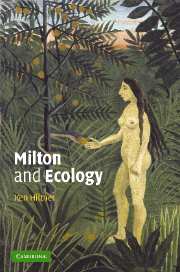Book contents
- Frontmatter
- Contents
- Acknowledgments
- Preface
- Introduction
- PART I HAVING PLACE
- 1 Place defined: the ecological importance of place
- 2 Place given: Eve as the garden's spirit of place
- 3 Place lost: Eve's Fall as an uprooting
- 4 Place regained: Sabrina puts down roots
- PART II THE UNDERLYING IMPORTANCE OF PLACE
- Notes
- Select bibliography
- Index
2 - Place given: Eve as the garden's spirit of place
Published online by Cambridge University Press: 15 December 2009
- Frontmatter
- Contents
- Acknowledgments
- Preface
- Introduction
- PART I HAVING PLACE
- 1 Place defined: the ecological importance of place
- 2 Place given: Eve as the garden's spirit of place
- 3 Place lost: Eve's Fall as an uprooting
- 4 Place regained: Sabrina puts down roots
- PART II THE UNDERLYING IMPORTANCE OF PLACE
- Notes
- Select bibliography
- Index
Summary
Why has man thus rooted himself firmly in the earth, but that he may rise in the same proportion into the heavens above?
Henry David Thoreau, WaldenIn this section I intend to argue that Milton deconstructed medieval theology's dualistic representations of Cristianity. To suggest that Milton “deconstructed” anything (let alone Christianity) may seem little more than a thinly veiled attempt to attach this work to an influential movement; nonetheless, I hope not only to bring attention to recent scholarship that has traced deconstruction from Derrida (through Heidegger) to a surprising Reformation antecedent in Luther but also to approach Milton's “monism” in a new way. I shall argue that this monism may be seen as the result of Milton's de-structuring of medieval theology's dualistic Christianity, Christianity understood as being con-structed within what I am terming the “Christian–pagan” dyad.
Of course, it will not be suggested that Milton simply inverted the structure to privilege the pagan or Earthy; on the contrary, I shall argue that Milton suggests an origin of the Christian–pagan dyad in a scripturally sanctioned Christianity rooted in the Earth which understands human beings as “Spirits rooted in the Earth” or “Spirits of place.” Seen in these terms, Milton's deconstruction may seem a risky business indeed, in that he is unabashedly embracing that Earthy aspect of Creation that a thousand years of Church doctrine had sought to cleave off from the Spirit.
- Type
- Chapter
- Information
- Milton and Ecology , pp. 30 - 42Publisher: Cambridge University PressPrint publication year: 2003



